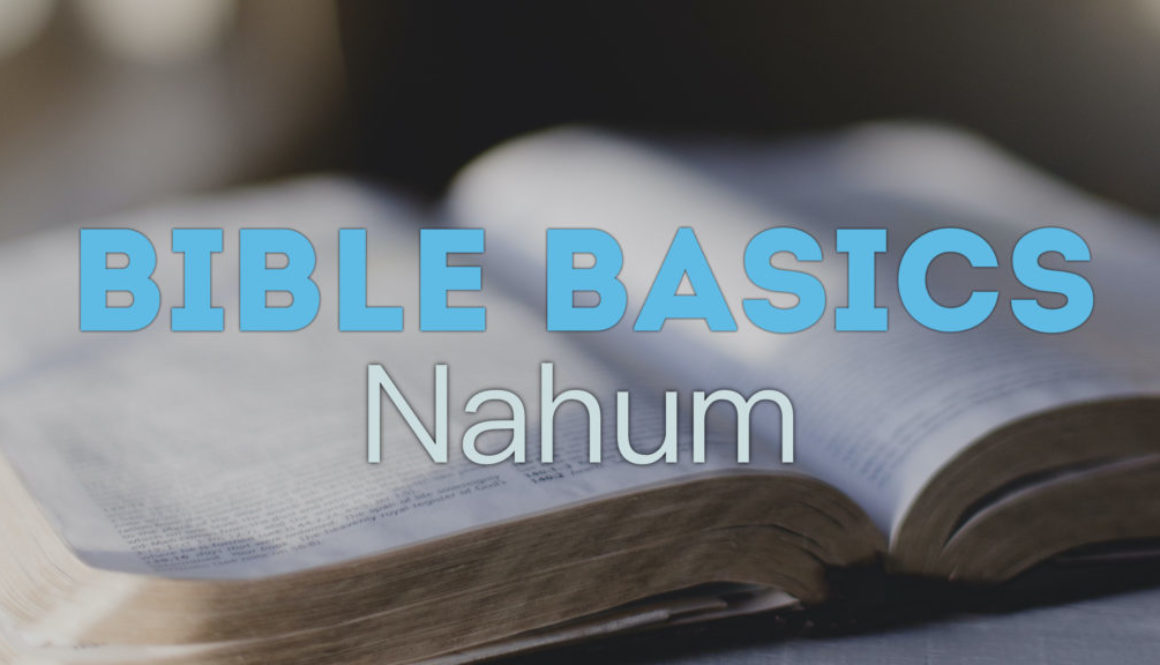Nahum
Author
Nahum, whose name is likely a shortened version of the name Nehemiah, which means “consolation” or “comfort.” Nahum is not mentioned elsewhere in scripture, and little is known about his personal life, except that he was from the town of Elkosh (Nahum 1:1).
Date
The events recorded in the book of Nahum occurred after the northern kingdom of Israel had already been carried away into Assyrian captivity, while the nation of Judah was still free. Nahum references the fall of Thebes (Nahum 3:8-10) , the greatest threat to Assyrian power, which occurred in 663B.C; and then prophecies the coming fall of Assyria, which would occur in 612B.C. The exact date of Nahum’s writing would have happened during this window of time, although a specific reference marker, such as a Judean King is not mentioned.
The best scholarly wisdom puts the writing closer to the fall or Thebes, rather than nearer the time of Assyria’s downfall, due to the fact that by the later half of the 7th century, Assyrian influence in the western provinces had already began to decline.
Audience and Purpose
Although Nahum was writing to the southern kingdom of Judah (Nahum 1:13, 15), the primary target of his prophecies was Assyria and it’s capitol, Nineveh. Over 100 years since Jonah preached repentance to the great city, Nahum now brings a message of God’s forthcoming judgement for the nation’s ongoing sin. The fast-paced tone of Nahum’s writing brings a sense of urgency or swiftness to what would befall that nation.
Major Themes
- Prophecy.
- Sin and Judgement
- Sovereignty of God
- Deliverance. God’s promise of judgement on Assyria becomes a message of comfort to Judah, who would not face destruction by this looming power anymore. (See Nahum 1:12)
Key Scriptures
- Nahum 1:2-3a — “The LORD is a jealous and avenging God; the LORD is avenging and wrathful; the LORD takes vengeance on his adversaries and keeps wrath for his enemies. The LORD is slow to anger and great in power, and the LORD will by no means clear the guilty…”
- Nahum 1:15a — “Behold, upon the mountains, the feet of him who brings good news, who publishes peace!
Outline
- Nahum 1:1-15 — Song of Praise for God’s Wrath Against Nineveh
- Nahum 2:1-13 — Description of Nineveh’s Downfall
- Nahum 3:1-19 — Mockery Through a Song of Lament for Nineveh
Gospel Summary
Looking for the gospel, or, in fact any theological theme in Nahum, can be a challenge, as the book primarily seems to be a pre-celebration over the fall of Nineveh. However, there are still some key points to be made. The biggest takeaway is that God is the Lord of History. Just as He had previously propped up Assyria as His tool to bring judgement against Israel, He now sovereignly decrees that this unbeatable force in the middle east would find a sudden end.
Although Nahum’s prophecy primarily addresses Nineveh, a big underlying message is the reminder to Judah that their own sins have loomed large in the past, and they must be diligent to walk according to God’s commands moving forward. God had brought affliction on Judah (Nahum 1:12), just as He would now bring on Nineveh, so their hope must continue to be in Him alone. They should not just celebrate the destruction of God’s enemies; they must make sure to remain God’s friends.
Since we can trust that God is the Lord of all History, then the book of Nahum does remind us to look forward to all the prophetic promises made in other places concerning the coming Messiah. Although Messiah is not addressed directly, Nahum 1:15 has been considered by many to be a reference to the coming of Jesus, who would finally bring the “good news” of salvation to those who hope in God. As Ephesians 2:17 says, “And (Jesus) came and preached peace to you who were far off and peace to those who were near.”
If you’re enjoying the content I produce, a little caffeine to keep me going would be appreciated!
© Anthony Scott Ingram 2021. All Rights Reserved.
Photo by Carolyn V on Unsplash
Unless otherwise indicated, all Scripture quotations are from The Holy Bible, English Standard Version®, copyright © 2001 by Crossway Bibles, a publishing ministry of Good News Publishers. Used by permission. All rights reserved.”
Please note that I do get a small kickback from Amazon for any purchases made using the links on this post. Should you choose to purchase from them, I just want to say thank you for further supporting my work in ministry!
